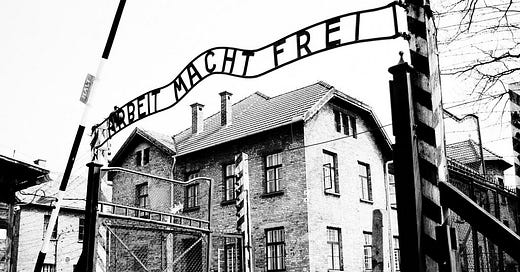In a free society, we should be legally allowed to debate anything.
I argued this point on my show some years back, offering up as an example the question of whether the Holocaust actually happened. It was a useful illustration because it isn’t a question at all.
The Holocaust happened. The Nazis exterminated six million Jews. It remains history’s most evil crime.
Even so, Holocaust denial and Holocaust downplaying exist.
When I ran for office a couple of years later, one of the attacks lobbed my way was that I had said the Holocaust was “debatable.” This was a dishonest and exceedingly literal interpretation of my actual point. My defense of free speech is all-encompassing, which means I don’t carve out exceptions for speech I deplore, like Holocaust denial.
In 2011, I spent a week at Yad Vashem, Israel’s national Holocaust museum, immersed in the history of the Holocaust. I’ve interviewed survivors and the descendants of victims. The proof of the Holocaust’s existence and scale is irrefutable.
But this is not a trump card that warrants censorship of those who, for whatever reason, insist otherwise.
Buried in the Canadian budget, inexplicably, is a provision that will criminalize Holocaust denial.
“There is no place for antisemitism and Holocaust denial in Canada,” Public Safety Minister Marco Mendicino said. "That's why we've pledged to prohibit the wilful promotion of antisemitism through condoning, denying or downplaying the Holocaust.”
The Liberals’ budget text is lifted from a private member’s bill introduced in February by Conservative MP Kevin Waugh to make "Holocaust denial, one of the main indicators of antisemitism and radicalization, illegal in Canada."


It was perplexing from the Conservatives given their vociferous opposition to the 2017 anti-Islamophobia motion M-103, which they rightfully criticized for singling out one particular form of hate and potentially curbing free expression by calling for a “whole of government” approach to ending Islamophobia.
Unlike M-103, the Holocaust denial ban has a direct criminal sanction. It literally restricts speech.
Holocaust denial is not speech that adds anything constructive to the marketplace of ideas, but this is irrelevant. John Stuart Mill’s utilitarian defense of free speech has never sat well with me for this reason. Free speech isn’t just defensible because of the positive benefits it might yield – it’s defensible because freedom itself is inherently good.
The allure of a ban on Holocaust denial no doubt makes for good politics. The Liberals’ favorite pastime is calling their opponents racists and Nazis, so no doubt anyone who opposes this on free speech grounds will be branded a “Holocaust denier.”
Several Jewish groups have spoken out in support of the move, though this is short-sighted and speaks to an understandable but overly narrow focus on curbing antisemitism.
Antisemitism is a pervasive problem. As my friend Laura Rosen Cohen always says, everyone meets at Jew-hate Junction. But criminalizing speech is neither an effective nor justifiable remedy to this.
Supporting a ban on Holocaust denial licenses the government to expand the parameters of censorship to appease any other group who claims a particularly insidious expression of speech is a harbinger of broader societal hate that needs to be reined in.
Islamophobia, transphobia, homophobia, anti-black racism, and so on. Stamping out all these things is desirable enough, but good luck getting everyone to agree on the definitions.
To some people, criticizing radical Islam is Islamophobic. To others, saying trans women aren’t women is transphobia.
If you think it’s conspiratorial to warn of this sort of law triggering a censorship creep, you needn’t look further than the United Kingdom, where police routinely visit people over supposedly problematic online posts, including many critical of the malleability of gender identity.
Last year, a Scottish woman was criminally charged with hate speech over “transphobic” tweets, though the Crown later dropped the charges.
Let’s not forget that the Liberals are already planning to clamp down on online speech with the forthcoming revival of section 13 of the Canadian Human Rights Act, a provision prohibiting “hate speech…in a context in which the hate speech is likely to foment detestation or vilification of an individual or group of individuals on the basis of a prohibited ground of discrimination.”
They sought to do this in the previous parliament with Bill C-36, though when this died on the order paper because of last year’s election, they pledged to reintroduce it in this parliamentary session.
Criminalizing Holocaust denial is easy because no one wants to defend the rights of bad people saying indefensible things. But rights are there for everyone. If you don’t defend bad people’s rights, the rights aren’t there when the good people need them.
Thanks for reading! If you aren’t already on the mailing list, click the “Subscribe now” button so you never miss an edition of this newsletter. If you really enjoyed it, consider taking out a paid subscription so it remains viable to continue publishing this.





If you were running for office today, you wouldn't even need to argue for a particular kind of free speech in order to be maligned. According to legacy media, free speech itself is now solely a "far right" concept.
Great objectivity as always from you. Thanks